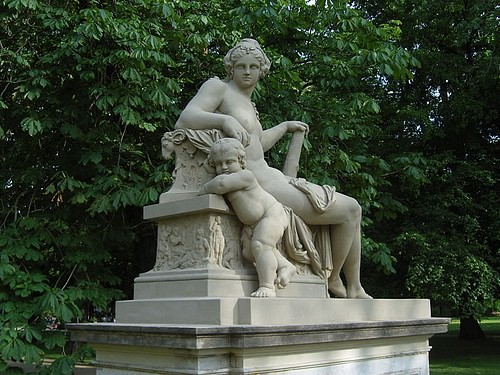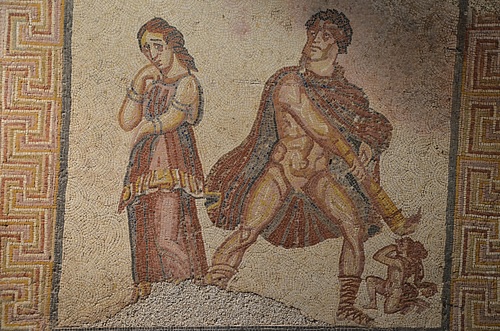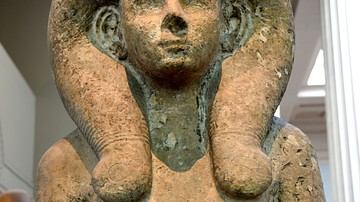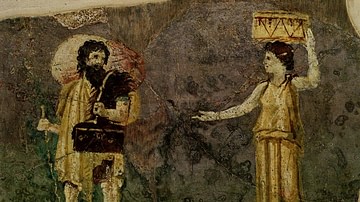
Megara was the first wife of the Greek hero Herakles (better known as Hercules). She was the daughter of King Creon of Thebes who gave her in marriage to Hercules in gratitude for his help in winning back Creon's kingdom from the Minyans. Megara's story is best known through the work of the Greek playwright Euripides (480-406 BCE) and the later Roman playwright Seneca (4 BCE-65 CE) both of whom wrote plays concerning Hercules and Megara. Her story was known long before Euripides wrote his play, though, and different versions of her brief life with Hercules differ on detail and chronology but relate the same basic story.
Nothing is known of Megara before her marriage to Hercules. He was the son of Zeus, king of the gods, and a mortal woman named Alcmene. Zeus was married to the goddess Hera but was well-known for his affairs with mortal women. He transformed himself to appear as Alcmene's husband, slept with her, and so conceived Hercules. Hera, who was always enraged by the dalliances of her husband, dedicated herself to making Hercules' life as miserable as she possibly could. Her vendetta was made difficult, since Hercules was a demi-god and possessed super-human strength and endurance but, still, she certainly did her utmost to try to destroy him at every opportunity.
Hercules grew up in the court of his supposed-father Amphitryon, where he was tutored in all the arts and disciplines a young nobleman was required to master, such as fencing, wrestling, music, and martial skills. When he heard that the neighboring kingdom of Thebes had been taken over by Minyans and the army defeated, he led a band of Theban warriors to drive the Minyans out and restore King Creon to the throne. Creon, in gratitude, gave him Megara as wife.
Megara and Hercules had three sons (though some sources claim eight children): Therimachus, Deicoon, and Creontiades. The couple were happy with their family until Hercules was called away on some adventure and the kingdom was left defenseless. Where, exactly, Hercules goes depends upon the version of the story one reads. In Euripides' play Heracles (written c. 420-415 BCE), he is performing the last of his famous Twelve Labors and is in the underworld attempting to subdue the three-headed dog Cerberus. This same story is told in Seneca's Hercules Furens (The Madness of Hercules, written between 49-65 CE). In the older version of the myth, however, Hercules does not begin his labors until after the death of Megara and their children. In the works of Euripides and Seneca, a usurper named Lycus has taken the throne of Thebes in Hercules' absence, killed King Creon, and is now forcing marriage on Megara. The tension of the plays comes from the characters hoping Hercules will arrive in time to save them from Lycus and his schemes. When Hercules finally comes home, he defeats and kills Lycus and then gives thanks to the gods for his timely arrival and the safety of his family. As he is praying, however, he is struck by Hera with a madness in which he believes his sons are those of Lycus and that Megara is his adversary Hera, and he kills them all. The plays both end with Hercules in suicidal remorse at his deeds and his cousin Theseus helping him deal with his grief.
In the older versions of the myth, there is no coup in Thebes and no character of Lycus. Megara and Hercules and their sons are living happily in Thebes when Hera strikes Hercules with the madness which causes him to kill his children. In some versions he also kills Megara while in others her fate is not mentioned (though it seems she is killed or, in some way, dies soon after since she is never mentioned in his stories again). As in the plays, Hercules is suicidal with grief but is talked out of killing himself by his cousin Theseus who tells him he must atone for his sins instead of taking the coward's way out through death. Hercules goes to the Oracle at Delphi to ask what he must do and is sent to his cousin, the King Eurystheus, who sets him to the task of his Twelve Labors to expiate his sins.
Megara's story was always a very popular tragedy and set the paradigm (in the myths concerning Hercules) of Hera intervening in Hercules' life at those times when things were going best for him and destroying his happiness. The plays of Euripides and Seneca only made her story more popular, and she and her children came to be seen as a sort of archetype of the innocent caught between greater conflicting forces. Hercules' second wife, Deianira, would play a similar role in his story, but she, at least, had a hand in her own death. Megara is always portrayed in the myths as the guiltless innocent who, with her children, suffers a meaningless and brutal death. Later portrayals of her, such as the animated Disney film Hercules (1997), depict her as a con artist who is redeemed from her difficult past through her relationship with the hero. No ancient depictions of Megara present her in this light at all. Her role in the 2014 film Hercules, while not exact, is much closer to her traditional portrayal.






